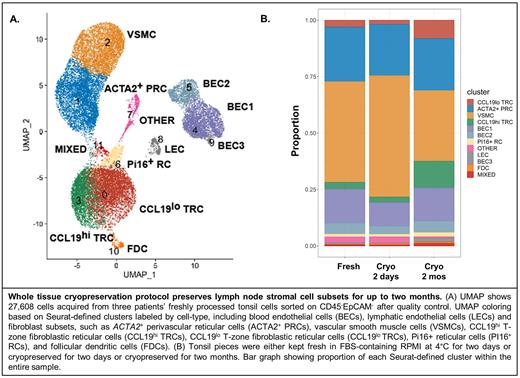Abstract
Despite comprising less than five percent of all cells in lymphoid tissues, non-hematopoietic lymph node stromal cells (LNSCs) play an out-sized role in shaping immune responses. LNSCs exert profound effects on lymphocyte trafficking, survival, and activation which can be dysregulated in lymphomas and other lymphoid tissue disorders. Unlike hematopoietic cells that have been analyzed extensively via large-scale biobanking, the study of LNSCs in human disease has been limited. LNSCs are embedded in collagen and other extracellular matrix proteins and cannot be extracted through mechanical dissociation into a single-cell suspension. Instead, serial enzymatic digestion must be used to isolate these rare cells. Given concerns about the sensitivity of LNSCs to digestion, researchers have been limited to using fresh tissue whenever LNs become available through patient surgeries, a labor-intensive strategy that is costly and subject to batch effects, and by necessity often involves work-up of tissues prior to establishment of a definitive diagnosis.
To address these issues, we developed a new application of whole-tissue cryopreservation for the study of LNSCs by flow cytometry and single-cell RNA sequencing (scRNAseq). Following this protocol with human tonsils as a model lymphoid tissue, we show that 2-3 mm pieces of lymphoid tissue can be cryopreserved for subsequent enzymatic digestion with comparable recovery of viable non-hematopoietic cells. In fresh tissue, we first defined relevant LNSC subsets through flow cytometry and scRNAseq. Flow cytometry identified podoplanin-CD31+ blood endothelial cells (BECs), podoplanin+CD31+ lymphatic endothelial cells (LECs) and podoplanin+CD31- fibroblastic reticular cells (FRCs). Using scRNAseq, we identified a heterogenous collection of both contractile and immune-interacting fibroblasts. These include contractile subsets like ACTA2+ perivascular reticular cells (ACTA2+ PRCs) and vascular smooth muscle cells (VSMCs), as well as immune-interacting FRC subsets like CCL19hi and CCL19lo T-zone fibroblastic reticular cells (TRCs) and follicular dendritic cells (FDCs). We validated these sub-populations using immunofluorescence microscopy, confirming the perivascular microanatomical position of ACTA2-expressing cells and the interstitial, reticular nature of CCL19-expressing fibroblasts.
We then employed two different DMSO-containing cryopreservative reagents (Cryostor CS10 from Sigma Aldrich or 10% DMSO in fetal bovine serum) to show that no LNSC or fibroblast sub-population was lost with cryopreservation compared to freshly processed tissue by both flow cytometry and scRNAseq. This held true for lymphoid tissue cryopreserved for up to two months. We recovered all LNSC subsets in similar proportions between fresh and cryopreserved tissue (see Figure). We also observed comparable gene expression between fresh and cryopreserved tissue. Furthermore, whole tissue cryopreservation ensured higher viability (>85%) compared to cryopreservation of enzymatically digested cells (50-60%), although this alternative strategy also maintained all scRNAseq-identified LNSC subsets.
Altogether, we demonstrated that whole tissue cryopreservation enables good recovery of all LNSC populations, employing sensitive scRNAseq to validate the efficacy of this strategy. This new approach provides a versatile tool to expand studies of LNSC's roles in lymphoproliferative disorders by enabling large-scale biobanking of lymphoid tissue. This will allow collection of a wide variety of clinical samples without excessive up-front financial and labor commitments. Our approach will also allow researchers to define pathological diagnosis ahead of study and to process multiple samples concurrently to minimize batch effects, thus enabling systematic studies of LNSC cells in the lymphoma microenvironment and in other lymphoid tissue disorders.
Disclosures
Brandstadter:EUSA Pharma: Consultancy. Fajgenbaum:EUSA Pharma: Consultancy, Research Funding. Maillard:Genentech: Research Funding; Garuda Therapeutics: Consultancy; Regeneron: Research Funding.
Author notes
Asterisk with author names denotes non-ASH members.


This feature is available to Subscribers Only
Sign In or Create an Account Close Modal